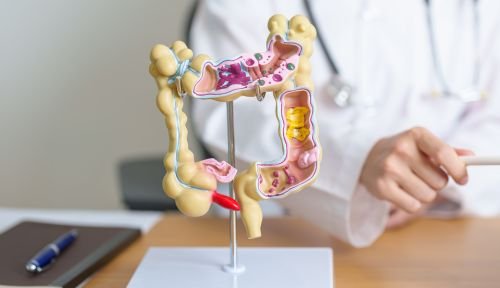Irritable bowel syndrome (IBS) is a common condition that affects your bowel function (a long-term digestive system condition that causes abdominal pain, diarrhea, constipation, and gas). IBS does not cause tissue damage in the intestine and does not increase the risk of more serious diseases such as colorectal cancer. However, it is a chronic condition that most people can manage with lifestyle and diet changes, medication, and behavioral therapy.1
Although IBS is a relatively common disease, many people diagnosed with this syndrome do not know how it affects their body, what the symptoms are, and how they can help themselves. Symptoms of IBS can range from mild discomfort to severe pain. In this article, we'll discuss what causes IBS, how it affects your body, what symptoms it causes, how to diagnose and treat it, and how you can help yourself.
A key step to effectively managing and controlling IBS is understanding what it is and how it affects your body. IBS is not a disease, but a syndrome, meaning it is a group of symptoms that occur together and cause discomfort or pain.
What is irritable bowel syndrome?
Irritable bowel syndrome is a disorder of the digestive system. The main symptoms are abdominal pain or discomfort, diarrhea, constipation, or both. Some people may experience bloating, gas, or the need to go to the bathroom frequently.

Interesting facts about the intestine
The intestine is one of the most important parts of our body. Not only does it help digest food and extract nutrients from it, it is also part of our immune system. This means that gut health can affect our entire body.
The gut is also home to billions of bacteria, called the gut microbiota. These bacteria help us digest food, make the vitamins we need, and protect us from harmful bacteria. However, if our gut microbiota is not balanced, it can lead to many health problems, including IBD.
Symptoms of irritable bowel syndrome
The symptoms of IBS can vary between individuals, but there are some common symptoms that most people experience. These can include abdominal pain and discomfort, changes in stool (such as diarrhea, constipation, or both), bloating, and gas.
Abdominal pain can be constant or intermittent, but it is usually associated with stool. The pain may decrease after defecation or the stool consistency may change. Gas and bloating are also common symptoms. They may be related to the consumption of foods that cause gas formation or to changes in digestive function.
Changes in stool are one of the most noticeable symptoms of IBS. This could mean constipation, diarrhea, or both. This can cause discomfort and inconvenience, especially if you are not ready for such changes.

Causes of irritable bowel syndrome
The exact causes of JS are not clearly understood, but it is believed to be related to several factors. One of them is disorders of the digestive system and nervous system. This can cause too much or too little bowel movement, which causes symptoms such as: diarrhea or constipation.
Another factor is an imbalance in your gut microbiota. This can happen due to poor diet, antibiotic use or stress. These factors can cause inflammation of the gut, which causes the symptoms of IBD.
Finally, stress and psychological status can also affect JS. Many people find that their symptoms worsen during times of stress or are related to their emotional state.
The exact causes of JS are not known. Many reasons have been suggested, but none have been conclusively proven. IBS can develop after a severe intestinal infection caused by bacteria or viruses. It can also be related to an overabundance of bacteria in the gut.
Types of DZS
Scientists classify UTI based on what your stool looks like on the days you have flare-ups. Most people with IBS have normal bowel movements on some days and abnormal ones on other days. Atypical days define the type of IBS you have:
- IBS with constipation (IBS-V): Most of your stools are hard and lumpy.
- UTI with diarrhea (UTI-D): Most of your stools are loose and watery.
- IBS with irregular bowel habits (IBS-M): Your stools are either hard and lumpy or loose and watery.
How often do people get JS?
This is a very common and relevant topic. Experts estimate that about 10-151 TP3T adults have IBD. Few people see doctors. Only about 5-71 cases of TP3T reach doctors who diagnose and help patients.
Understanding the effects of irritable bowel syndrome
IBS can have a big impact on your daily life. Symptoms can cause discomfort, inconvenience and stress. They can limit your activities, reduce your quality of life and even cause depression.
Abdominal pain, diarrhea and constipation can interfere with your work, study or leisure. It can cause anxiety and stress in the long run, especially if you don't know when the symptoms will appear.
In addition, IBS can affect your diet and food choices. Some people find that certain foods trigger or worsen their symptoms. This may require a change in diet, which can be difficult and cause additional internal stress.
Risk factors for irritable bowel syndrome
There are several factors that can increase your risk of developing IBS. One of them is age. JS is most often diagnosed in people under the age of 45.
Another risk factor is gender. Women are twice as likely to develop JD as men. This may be related to the hormonal changes that occur in the female body.
Genetics can also affect your risk of developing IBS. Research shows that people with a family history of IBS are more likely to experience this syndrome.
How is JS diagnosed?
The first part of the diagnosis is a detailed medical examination of the anamnesis. Your doctor will ask about your symptoms. They may ask:
- Is the pain related to bowel movements?
- Have you noticed a change in how often you have bowel movements?
- Have there been any changes in the way your stool looks?
- How often do symptoms occur?
- When did your symptoms start?
- What medicines are you taking?
- Have you recently been sick or had a stressful situation?

JS treatment
There is no single therapy that works for everyone, but most people with IBS can find a treatment plan that works. Common treatment options include changing your diet and routine. Medicines can also help. Behavioral health therapy can help.
There is no cure for IBS. However, most people can manage their symptoms by avoiding triggers and taking medication when needed.
Because the cause of IBS is unknown, it cannot be prevented or prevented. If you have IBS, you can prevent your symptoms from getting worse by avoiding the triggers that cause them.
What can you expect if you have IBS?
Living with IBS can be a challenge, as symptoms come and go throughout your life. Treatment often requires trial and error. But the good news is that almost all people with IBS can find treatment that helps them over time.

Tips for managing and preventing irritable bowel syndrome
Eating a healthy diet, exercising regularly, managing stress and maintaining a healthy weight are important to managing and preventing the symptoms of IBD. It's also important to avoid foods that can make symptoms worse, such as caffeine, alcohol, fatty foods, and some carbohydrates.
Regular physical activity can help regulate bowel movements and reduce stress, which can worsen IBS symptoms. This can include any physical activity that you enjoy, such as walking, running, swimming or yoga.
Managing stress is an important aspect of managing IBS symptoms. This may include meditation, breathing exercises, relaxation techniques or psychotherapy.
Nutrients that can help
Certain nutrients can help manage the symptoms of IBD. These include fiber, probiotics and peptides.
Fiber helps regulate bowel movements and can help control diarrhea and constipation.
-
Sale Product on saleKIKI Health Organic PSYLLIUM HUSKS - Natural Fiber for the gut, 120 capsules
39,90 €Original price was: 39,90 €.31,90 €Current price is: 31,90 €.Rated 5.00 out of 5 based on 4 customer ratings
Probiotics help maintain a healthy gut microbiota and can help reduce inflammation and symptoms.
-
Sale Product on saleKIKI Health BODY BIOTICS Probiotics - good bacteria with live prebiotics, 60 vegcapsules
49,90 €Original price was: 49,90 €.27,40 €Current price is: 27,40 €.Rated 5.00 out of 5 based on 1 customer rating
Peptides are nutrients that can help reduce inflammation and pain in the gut. They can be obtained from certain foods, such as dairy products, or as dietary supplements.

Lifestyle changes to improve irritable bowel syndrome
A number of lifestyle changes may be necessary to improve IBS. These may include dietary changes, increased physical activity, stress management, and adequate rest.
Dietary changes may include avoiding certain foods that may make your symptoms worse. This may include avoiding caffeine, alcohol, fatty foods, and some carbohydrates.
Physical activity helps regulate bowel movements, reduces stress, and can help control weight. This can include any physical activity that you enjoy, such as walking, running, swimming or yoga.
Stress management is another important lifestyle change. This may include meditation, breathing exercises, relaxation techniques or psychotherapy.
When to see a health professional
If you think you have symptoms of IBS, it is important to consult a healthcare professional. He can help determine if your symptoms are related to IBS and develop a treatment plan.
If your symptoms persist for more than three months or if they worsen, consult your doctor. If you have less frequent symptoms but they're interfering with your life, it's still worth talking to your primary care doctor.
A health care professional can perform several tests to diagnose IBS and offer different treatment options. This can include dietary changes, medications, stress management, and other lifestyle changes.
What questions should I ask my doctor?
If you have symptoms of IBS, ask your doctor:
- What medications can help?
- What foods should I avoid?
- What lifestyle changes should I make?
- When will I start feeling better?
FAQ Section: Irritable Bowel Syndrome
What is irritable bowel syndrome (IBS)?
Irritable bowel syndrome is a chronic condition of the digestive system that presents with a variety of symptoms such as abdominal pain, diarrhea, constipation, and bloating.
What are the main symptoms of IBS?
The main symptoms are abdominal pain or discomfort, changes in bowel function (diarrhea or constipation), and abdominal bloating and gas may also occur.
Is IBD dangerous?
Although IBS can severely affect quality of life, it is not a life-threatening condition and does not usually pose serious health threats.
How is JS treated?
Treatment depends on the severity of symptoms and may include dietary changes, medications, stress management, and other treatment strategies.
Is there a special diet for people with IBS?
Yes, a low-FODMAP diet works for some people, but you should consult with your doctor or dietitian to find the best eating plan for you.
Can IBS cause other digestive problems?
No, IBS does not increase your risk of diseases such as colitis, Crohn's disease, or colorectal cancer.
What you should know about DŽS
Irritable bowel syndrome and its symptoms, such as abdominal pain, diarrhea, constipation, and gas, are uncomfortable and can interfere with your life. But DŽS is managed. You can improve your symptoms by changing what you eat and adjusting your daily habits to better manage the factors that cause your symptoms. If you have abdominal symptoms that do not go away, talk to your healthcare provider. Together, you can find an IBS treatment plan that works for you.
Conclusions
Although irritable bowel syndrome is very common and can be difficult to manage, there are many strategies and techniques that can help reduce symptoms and improve quality of life. It's important to understand what's causing your symptoms and take steps to control them.
Healthcare professionals such as dietitians, gastroenterologists, and psychologists can help you understand and manage IBS. They can help you determine what foods or lifestyle changes may help reduce your symptoms and make treatment recommendations.
Remember that you are not alone. IBS is a very common condition, and there are many resources and communities that can provide support and information. With the right help and information, you can manage IBD and live a fulfilling life.













